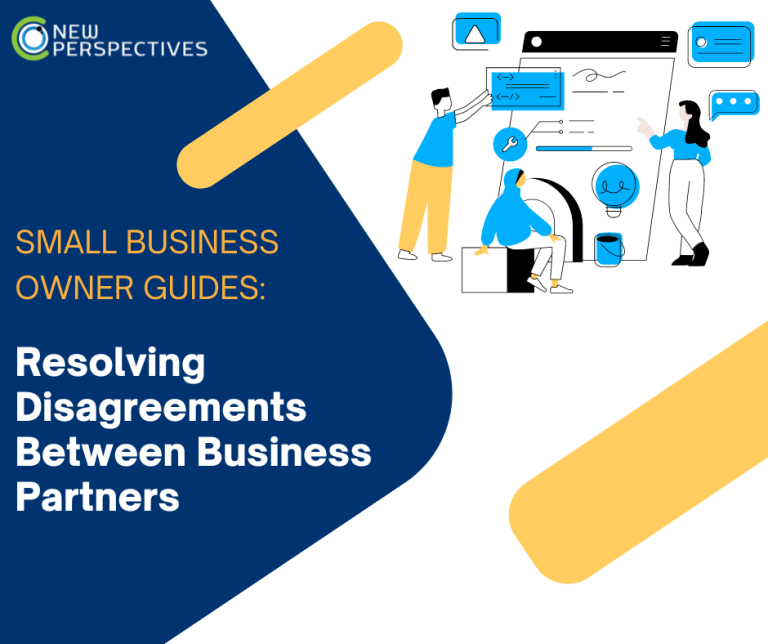Resolving Disagreements
Between Business Partners in a Small Business

Disagreements between business partners can be challenging, especially in a small business where collaboration and teamwork are critical for success. However, disagreements, if managed well, can lead to stronger partnerships and an improved business. In this article, we’ll explore practical strategies and techniques to resolve disagreements effectively and maintain a healthy business relationship.
Understanding the Sources of Disagreements
The first step in resolving any disagreement is understanding its root cause. Common sources of disagreements between business partners include:
- Financial Disagreements: Issues related to revenue distribution, investments, and expenses.
- Difference in Vision: Disagreement concerning long-term goals or business strategies.
- Roles and Responsibilities: Lack of clarity or disagreement over who handles what or perceived lack of effort or focus on the business from one partner.
- Communication Breakdown: Misunderstandings and lack of transparent, timely communication.
Effective Communication
Communication is key to resolving disagreements. Here are some key communication strategies:
- Listening: When you do talk with your business partner about the disagreement, give your partner time to talk. Resist the temptation to ‘jump-in’ and interrupt them. Give your partner your full attention, listen to what they are saying (even if you don’t agree with what they say), acknowledge their perspectives, and respond thoughtfully.
- Honest Expression: Share your thoughts openly but respectfully. Raw emotions can impede what we want to say. If you are feeling a disempowering emotion during the discussion such as anger or upset - take a deep breath and talk clearly and assertively rather than emotionally.
- Regular Communication: Schedule regular meetings to discuss any issues before they escalate into disagreements.
Establishing Clear Roles and Responsibilities
Clarifying roles and responsibilities early in the business helps to minimise disagreements. You can implement the following:
- Roles and Responsibilities: Create detailed job descriptions outlining each partner’s duties.
- Delegation Agreement: Agree on who handles which aspect of the business to avoid overlaps.
- Accountability Measures: Set clear accountability processes to ensure responsibilities are met.
Disagreement Resolution Techniques
Several techniques can help resolve disagreements effectively:
- Negotiation: Sit down and negotiate terms that respect both partners’ interests.
- Compromise: Be willing to find middle ground solutions that satisfy both parties.
- Mediation: Bring in a neutral third party to facilitate the conversation and find a mutually beneficial solution.
- Document Agreements: Once a resolution is reached, document it formally to ensure both parties adhere to the agreement.
Strengthening the Partnership
To prevent future disagreements and build a stronger partnership, consider the following:
Agreements vs. Assumptions: In my experience one of the common causes of disagreements between business partners is when one business partner has made an assumption rather than putting some form of ‘understanding’ or agreement in place.
For example - One partner has assumed the other partner would do a,b,c whereas the other partner assumed they would do x,y,z.
The ‘agreement’ does not necessarily mean a formal agreement. In this context the ‘agreement’ means a fully formed understanding between two or more people.
Agreements like this come from taking the time to talk openly, clearly, and honestly in discussions between business partners. A quick note, meeting minutes, or even an email can help with clarity on what is agreed. But of course, if a formal agreement is required then create one.
Conclusion
While disagreements are inevitable, how you handle them makes all the difference. By understanding the sources of disagreements, maintaining open communication, clarifying roles, and employing effective resolution techniques, you can turn disagreements into opportunities for growth – not just business growth, but also personal and professional growth. Remember, a strong partnership is built on trust, respect, and a shared vision.
Are you ready to take your business and life to the next level? Schedule a discovery call with me to discover how I can assist you in finding clarity in your life and work, overcoming challenges, and achieving your most ambitious goals.
During our call, we’ll discuss your current situation and explore where you want to be. Together, we'll enhance your focus, confidence, and drive, paving the way for your success.
Click the button below to schedule your free discovery call today!
We need your consent to load the translations
We use a third-party service to translate the website content that may collect data about your activity. Please review the details in the privacy policy and accept the service to view the translations.

